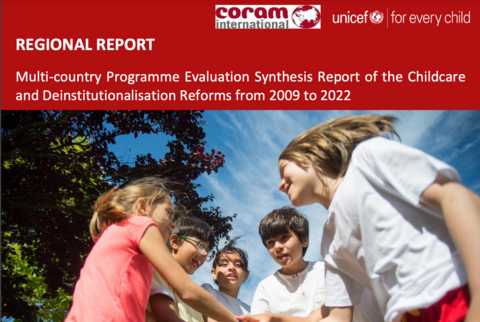This report presents the main findings, conclusions, and recommendations of an evaluation of the child care and deinstitutionalisation reforms in seven countries in the Europe and Central Asia Region (Bulgaria, Georgia, Moldova, Montenegro, Northern Macedonia, Serbia and Tajikistan). The report offers valuable insights into the effectiveness of child protection systems and the transition from institutional care to family- and community-based alternatives. It highlights key achievements, lessons learned, and best practices, while also addressing the areas where further improvements are needed to ensure that every child can grow up in a nurturing, safe, and supportive environment.
Purpose, Objectives, User
The object of the evaluation is the national child care reforms undertaken between 2009 and the end of 2022, with a focus on deinstitutionalisation (DI) across the seven evaluation countries in Europe and Central Asia. The evaluation aims to assess the strengths and weaknesses in approaches taken by different countries; provide insight into system level bottlenecks and, in particular, to assess the results achieved by governments and UNICEF to date (outcome and impact level) in supporting children with disabilities and other highly marginalised and vulnerable children in the region to remain with their families or in family-based care.
The evaluation had four objectives which applied to all countries involved in the evaluation:
- Assess the impact of government child care policies and understand what worked and what did not in the deinstitutionalisation of children, in particular children with disabilities and other ‘difficult to place’ children, how and why;
- Determine the effectiveness, impact, coherence, relevance and efficiency of national child care reforms;
- Assess the actual and potential contribution of UNICEF’s work to national progress (including the outcomes and impacts of programming) in child care and deinstitutionalisation reforms, including children with disabilities and other ‘difficult to place children;’
- Identify lessons and provide recommendations for refinement and potential scaling up of good practices to further support national governments in strengthening child protection systems. The intended audience of this regional Evaluation includes the Government and relevant ministries of the seven countries, UNICEF regional and country offices and external donors, in particular the EU. The child care reforms are intended to contribute to Sustainable Development Goal (SDG) 1, by addressing the financial burdens on families with children with disabilities; SDG 4, by offering quality inclusive education; SDG 5, by promoting gender equality; SDG 10, as it relates to mitigating disparities between individuals with and without disabilities and SDG 16, by fostering inclusive and just societies.

